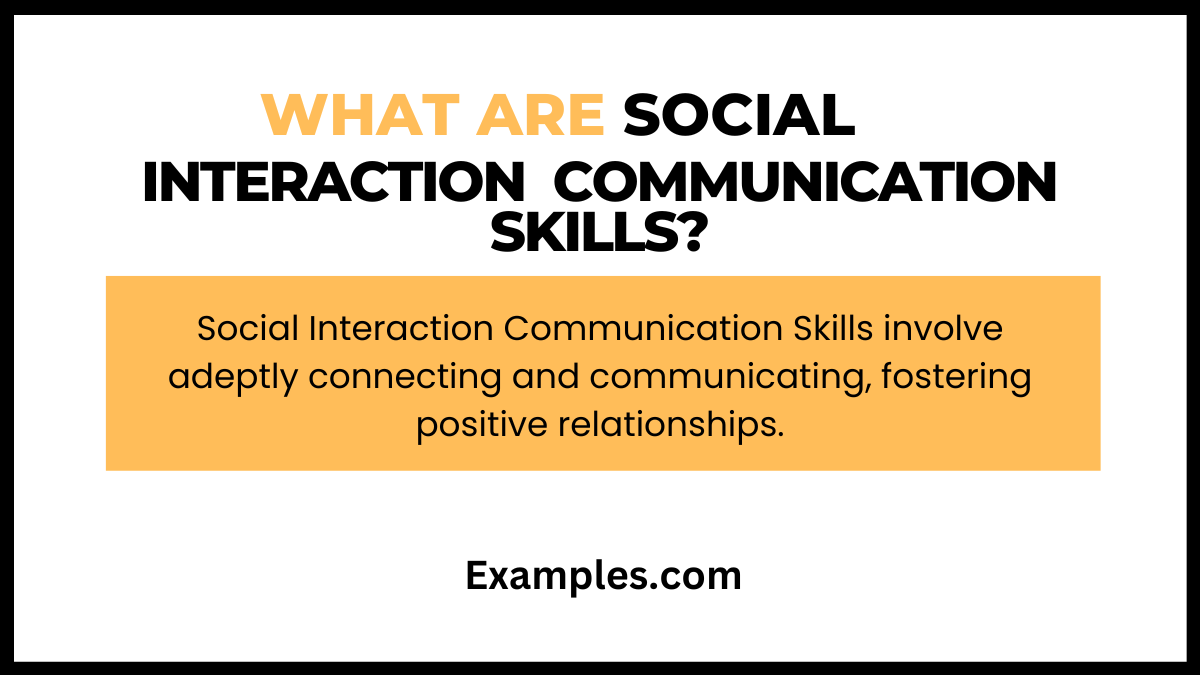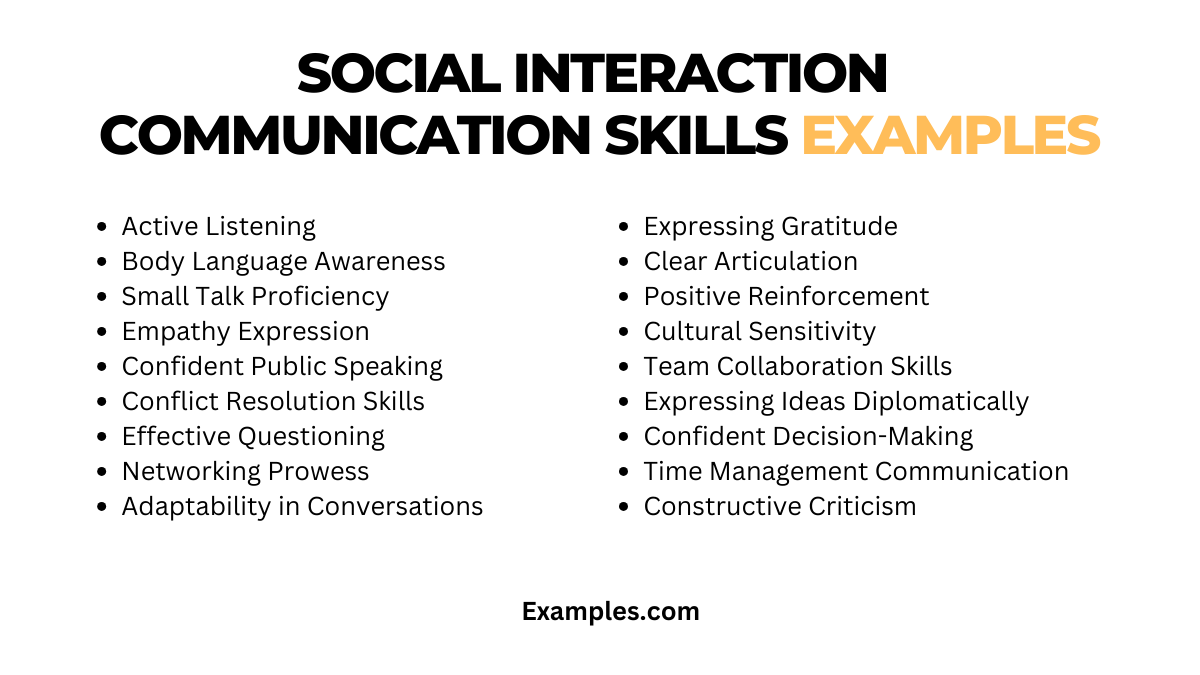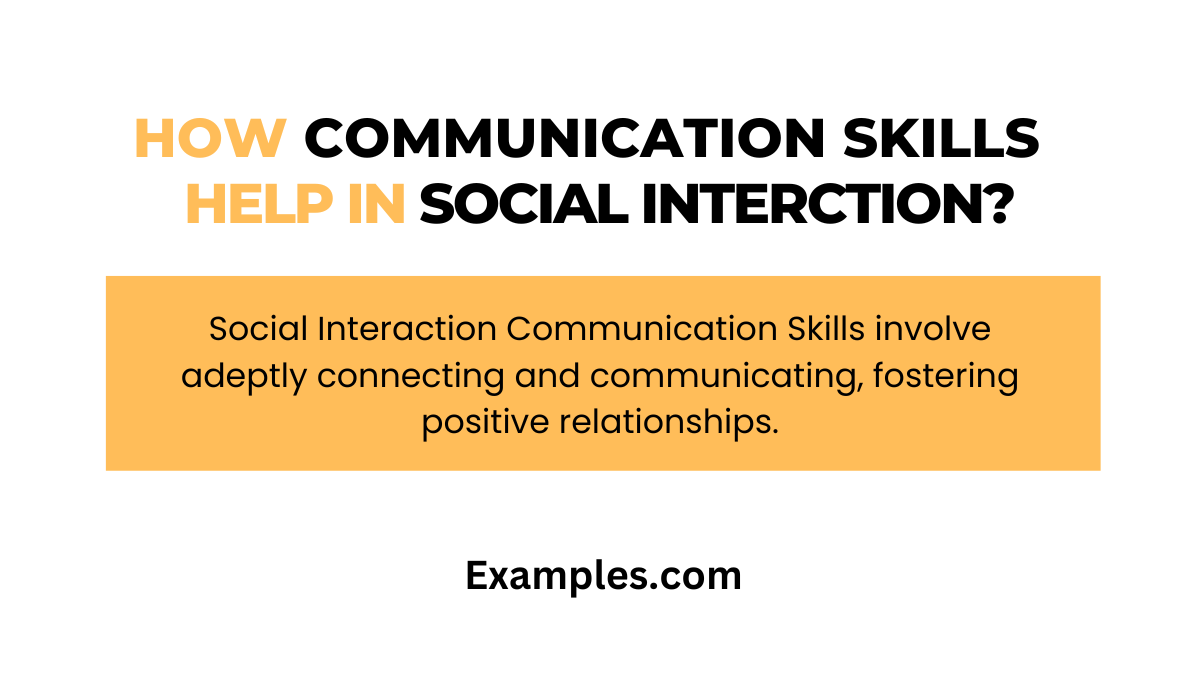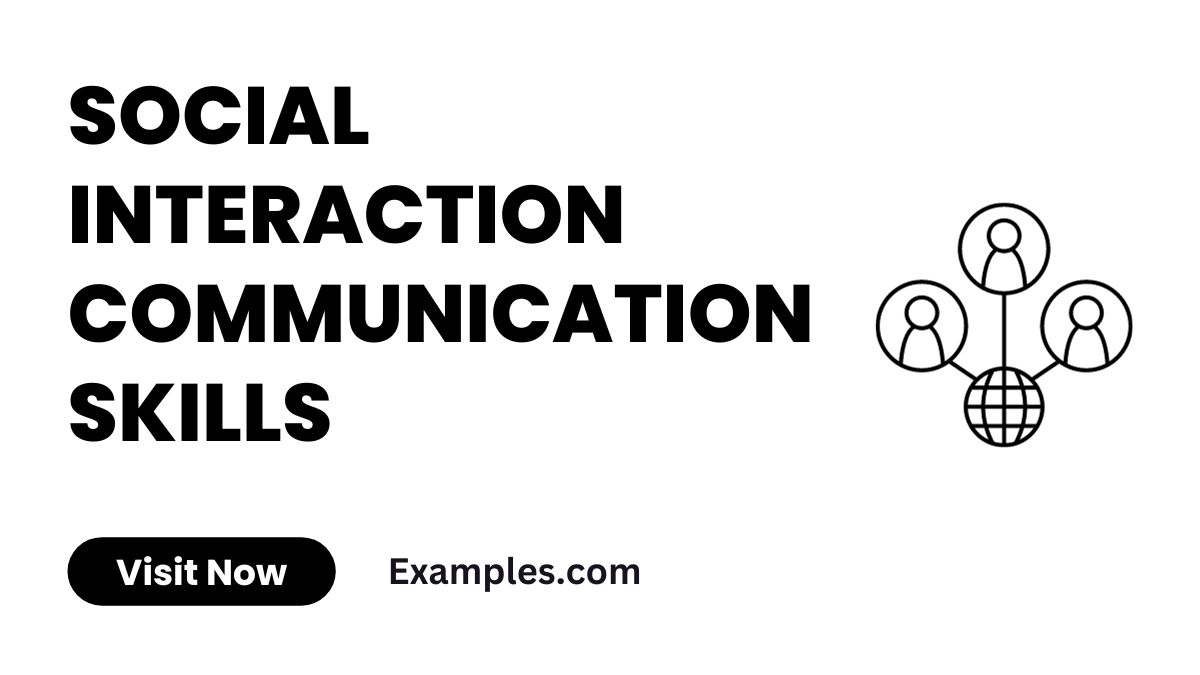Social Interaction Communication Skills
Unlock the art of effective communication with Social Interaction Communication Skills, a vital aspect of interpersonal dynamics. Learn proven strategies and practical tips through Communication Examples for seamless interactions in diverse social settings.
What are Social Interaction Communication Skills?

Social Interaction Communication Skills encompass the ability to convey thoughts, emotions, and information effectively in various social contexts. It involves verbal and nonverbal cues, active listening, and adaptability to foster meaningful connections.
30 Social Interaction Communication Skills Examples

Develop your social finesse with these exemplary communication skills. Master the art of small talk, express empathy, and build rapport effortlessly in various scenarios. Enhance your interactions with assertive yet respectful communication, ensuring effective and meaningful connections.
- Active Listening: Practice attentive listening, responding thoughtfully to demonstrate understanding.
Example: “I hear your concerns and appreciate your perspective.” - Body Language Awareness: Utilize open body language for approachability.
Example: Maintain eye contact and avoid crossing arms. - Small Talk Proficiency: Navigate casual conversations with ease, finding common ground.
Example: “Did you catch the latest movie? I found it intriguing.” - Empathy Expression: Connect emotionally, showing understanding and compassion.
Example: “I can imagine how challenging that situation must be for you.” - Confident Public Speaking: Deliver speeches with clarity and confidence.
Example: “I’d like to share my insights on the upcoming project.” - Conflict Resolution Skills: Resolve conflicts diplomatically for harmonious relationships.
Example: “Let’s discuss our differences and find common ground.” - Effective Questioning: Pose insightful questions to encourage discussion.
Example: “What are your thoughts on this matter?” - Networking Prowess: Build professional connections with genuine interest.
Example: “I’d love to learn more about your work and experiences.” - Adaptability in Conversations: Adjust communication style to suit diverse audiences. Example: “Let me explain this in simpler terms for everyone to grasp.”
- Expressing Gratitude: Acknowledge and appreciate others sincerely.
Example: “Thank you for your hard work; it doesn’t go unnoticed.” - Clear Articulation: Communicate ideas clearly and concisely.
Example: “Allow me to summarize our key points for clarity.” - Positive Reinforcement: Offer encouragement and positive feedback.
Example: “You handled that situation exceptionally well.” - Cultural Sensitivity: Navigate conversations respecting diverse cultures.
Example: “I appreciate the cultural nuances in your approach.” - Team Collaboration Skills: Contribute constructively in group discussions.
Example: “Let’s build on each other’s ideas for a comprehensive solution.” - Expressing Ideas Diplomatically: Share opinions respectfully to avoid conflicts.
Example: “I see where you’re coming from, and I’d like to offer an alternative perspective.” - Confident Decision-Making: Make decisions decisively while considering others’ input.
Example: “After careful consideration, I propose we move forward with this plan.” - Time Management Communication: Express urgency and manage time effectively.
Example: “We need to prioritize this task to meet the deadline.” - Constructive Criticism: Provide feedback that promotes growth.
Example: “I value your work; here’s an opportunity for improvement.” - Humor Integration: Inject appropriate humor to lighten the mood.
Example: “Let’s not take ourselves too seriously; we’re all learning.” - Online Communication Etiquette: Navigate digital interactions professionally.
Example: “Ensure your emails convey the intended tone and message.” - Negotiation Skills: Bargain effectively for mutually beneficial outcomes.
Example: “Let’s find a compromise that satisfies both parties.” - Nonverbal Consistency: Align verbal and nonverbal cues for authenticity.
Example: “My enthusiasm for this project is evident in my commitment.” - Praising Others Publicly: Recognize achievements openly to boost morale.
Example: “Kudos to the team for exceeding expectations on the recent project.” - Understanding Social Cues: Read and respond to social signals for appropriate interactions.
Example: “I sense some hesitation; would you like to share your thoughts?” - Maintaining Professionalism: Uphold professional conduct in all interactions.
Example: “Even in challenging situations, maintaining professionalism is crucial.” - Social Media Engagement: Participate in online discussions respectfully.
Example: “Your insights on this topic resonate with many; thanks for sharing.” - Respecting Personal Boundaries: Avoid intrusive questions and respect privacy.
Example: “Let’s focus on work-related matters during this discussion.” - Collaborative Decision-Making: Involve others in decision-making processes.
Example: “Your input is valuable; let’s decide as a team.” - Reflective Listening: Summarize and reflect on others’ statements for clarity.
Example: “If I understand correctly, you’re suggesting…” - Conflict Avoidance Skills: Navigate delicate topics with tact to prevent conflicts.
Example: “I sense this topic might be sensitive; can we discuss it privately?”
Social Interaction Communication Skills Examples for Students
Enhance your academic journey with vital communication skills. Practice active listening during lectures, engage in group discussions, and deliver clear presentations. In collaborative projects, demonstrate effective teamwork, and express ideas diplomatically. Cultivate relationships with peers through small talk and positive reinforcement, creating a conducive learning environment.
- Active Participation in Classroom Discussions: Contribute thoughtfully to class discussions, promoting a dynamic and inclusive learning atmosphere.
- Peer Collaboration on Group Projects: Work seamlessly in student groups, fostering effective communication for successful project outcomes.
- Constructive Feedback Delivery: Provide classmates with constructive feedback, promoting a culture of growth and improvement.
- Clear Articulation in Presentations: Deliver presentations with clarity, ensuring peers grasp the key concepts effortlessly.
- Engaging in Extracurricular Activities: Join clubs and societies, honing social skills through diverse interactions beyond the classroom.
- Conflict Resolution in Student Teams: Navigate conflicts diplomatically within student teams, fostering a harmonious collaborative environment.
- Networking at Academic Events: Develop networking skills at academic events, building connections with peers and faculty members.
- Expressing Ideas in Writing: Communicate effectively through written assignments, showcasing articulate expression of thoughts and ideas.
- Peer Teaching for Knowledge Sharing: Embrace opportunities to explain concepts to peers, reinforcing your understanding and theirs.
- Participation in Student-led Initiatives: Engage in student-led initiatives, demonstrating leadership and effective communication in a broader context.
Social Interaction Communication Skills Examples at Workplace
Navigate the professional landscape with finesse by mastering workplace communication skills. Effectively collaborate on projects, deliver impactful presentations, and build positive relationships with colleagues. Showcase adaptability in diverse work settings, employ clear articulation in meetings, and foster a supportive work culture through empathy and active listening.
- Adapting to Team Dynamics: Adjust communication styles in diverse teams, ensuring effective collaboration and understanding.
- Professional Email Communication: Craft clear and concise emails, fostering efficient communication within the workplace.
- Conflict Resolution in the Office: Resolve workplace conflicts diplomatically, promoting a positive and cooperative work environment.
- Effective Communication in Meetings: Contribute thoughtfully in meetings, ensuring your ideas are expressed clearly and comprehensively.
- Building Professional Relationships: Cultivate positive relationships with colleagues, fostering a collaborative and supportive workplace culture.
- Leadership Communication Skills: Showcase leadership qualities through effective and inspirational communication with team members.
- Negotiation Skills in Business Deals: Bargain effectively in business negotiations, ensuring mutually beneficial outcomes for all parties involved.
- Time Management Communication: Communicate urgency and priorities effectively, contributing to efficient time management within the team.
- Cross-Departmental Collaboration: Collaborate seamlessly across different departments, enhancing communication and achieving shared goals.
- Mentorship and Knowledge Sharing: Engage in mentorship, sharing knowledge and insights to foster a culture of continuous learning.
Social Interaction Communication Skills Examples for Interview
Ace your interviews by mastering social interaction communication skills. Demonstrate confident verbal articulation, effective body language, and keen listening skills. Respond to questions with clarity, showcase adaptability, and express gratitude. Utilize storytelling techniques to make your experiences memorable, and negotiate assertively when discussing terms.
- Confident Self-Introduction: Begin the interview with a confident self-introduction, setting a positive tone for the conversation.
- Adaptability in Answering Questions: Adjust responses to showcase adaptability, emphasizing your flexibility in various work scenarios.
- Expressing Gratitude During Interviews: Convey gratitude for the interview opportunity, showcasing appreciation for the chance to discuss your qualifications.
- Storytelling to Highlight Achievements: Share anecdotes that highlight your achievements, making your experiences more memorable for the interviewer.
- Effective Handling of Behavioral Questions: Respond thoughtfully to behavioral questions, showcasing your problem-solving and decision-making skills.
- Assertive Salary Negotiation: Negotiate assertively when discussing salary and benefits, ensuring a fair and mutually beneficial arrangement.
- Body Language Confidence: Maintain confident body language throughout the interview, projecting assurance and professionalism.
- Active Listening to Interviewer’s Questions: Listen attentively to the interviewer’s questions, responding thoughtfully to demonstrate comprehension.
- Handling Stressful Situations Gracefully: Navigate stressful questions or scenarios with grace, showcasing your ability to handle pressure.
- Follow-up Email Post-Interview: Send a follow-up email expressing gratitude and reiterating your interest in the position, leaving a positive impression.
How Communication Skills Help You in Social Interaction?

Communication skills are the bedrock of successful social interaction, acting as the conduit for expressing thoughts, emotions, and ideas. Proficient communication fosters deeper connections, allowing individuals to articulate themselves clearly, understand others empathetically, and navigate diverse social scenarios with ease. Verbal fluency, active listening, and nonverbal cues contribute to effective communication, enhancing one’s ability to build relationships, resolve conflicts, and create a positive social environment.
In social interaction, communication skills enable individuals to convey intentions, share experiences, and connect on a personal level. Whether engaging in casual conversations, participating in group activities, or navigating more formal settings, effective communication facilitates mutual understanding and enriches the quality of interpersonal relationships.
Why Are Social Interaction Communication Skills Essential?
Social interaction communication skills are indispensable for several reasons. Firstly, they empower individuals to express themselves authentically, fostering genuine connections with others. Secondly, effective communication contributes to conflict resolution, preventing misunderstandings and promoting harmonious relationships. Thirdly, strong communication skills are crucial in professional and personal settings, influencing success in career advancement, networking, and personal development.
In the digital age, where communication spans various platforms, honing social interaction communication skills is essential for navigating diverse channels effectively. As society becomes more interconnected, individuals with strong communication skills stand out, as they can navigate cultural nuances, adapt their communication style, and engage with a wide range of people seamlessly.
Tips for Effective Social Interaction Communication Skills
- Active Listening: Cultivate active listening habits to fully comprehend others’ perspectives, showing respect and interest in the conversation.
- Nonverbal Cues: Be mindful of nonverbal cues like body language and facial expressions, as they complement verbal communication and convey additional meaning.
- Verbal Clarity: Express ideas clearly and concisely, avoiding jargon or ambiguity, to ensure that your message is easily understood.
- Empathy: Practice empathy to understand others’ emotions and viewpoints, creating a supportive and compassionate social environment.
- Adaptability: Tailor your communication style to suit different social contexts, considering factors such as formality, cultural diversity, and individual preferences.
- Constructive Feedback: Provide constructive feedback when necessary, promoting open and honest communication while maintaining a positive tone.
- Conflict Resolution Skills: Develop skills to navigate conflicts gracefully, emphasizing resolution rather than escalation, and fostering healthier relationships.
- Positivity and Encouragement: Infuse positivity and encouragement into conversations, creating an uplifting and inclusive social atmosphere.
- Cultural Sensitivity: Be aware of cultural differences, respecting diverse communication norms, and fostering cross-cultural understanding.
- Continuous Learning: Strive for continuous improvement in your communication skills, seeking feedback, and adapting to evolving social dynamics.
In conclusion, mastering social interaction communication skills is not just about excelling in personal and professional interactions; it’s about nurturing relationships, personal growth, and career advancement. Effective communication forms the cornerstone of successful interactions, allowing us to convey our thoughts and feelings clearly and understand others’ perspectives. This is particularly crucial in an era where communication spans various platforms and cultures.
- Personal Development Through Communication: Effective communication plays a pivotal role in personal development. It helps build and maintain relationships, fostering an environment where we can share ideas and emotions, leading to a better understanding of ourselves and others. This process is instrumental in developing new skills, making decisions quickly, and exploring creativity.
- Professional Growth and Communication Skills: In the professional realm, communication skills are paramount. They are not only highly valued by employers but are also essential for effective management and collaboration within the workplace. Corporate recruiters rank oral communication skills as a top professional skill, emphasizing the need for strong interpersonal skills in the modern workplace. Effective communication minimizes misunderstandings, mistakes, and conflicts, thereby enhancing overall work efficiency.
For further reading on the importance of communication in personal development, you can visit the School of Meaningful Experiences at SoME Education. For insights on effective communication in professional development, BetterUp provides comprehensive resources and guidance.
These resources can offer additional strategies and deeper understanding of how to apply communication skills in various aspects of life, enriching both personal and professional experiences.



